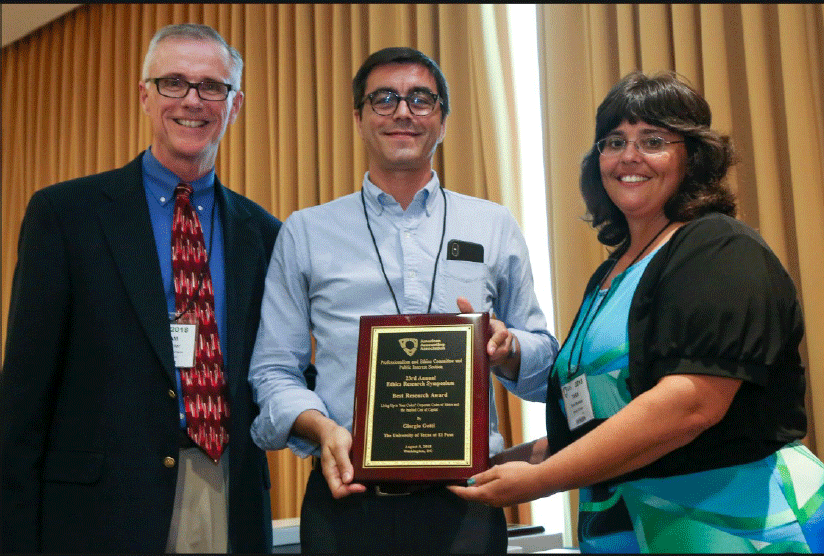UTEP Research Recognized at American Accounting Association Research Symposium
Last Updated on October 02, 2018 at 12:00 AM
Originally published October 02, 2018
By UC Staff
UTEP Communications
UTEP Associate Professor Giorgio Gotti, Ph.D., chair of the accounting and information systems department, received the Best Research Award at the 23rd Ethics Research Symposium at the 2018 American Accounting Association (AAA) Annual Meeting in Washington D.C.

His winning article was titled “Living Up to Your Codes? Corporate Codes of Ethics and the Implied Cost of Capital.”
Gotti was recognized along with the paper’s co-authors Hong Kim Duong, Ph.D., a UTEP alumna and assistant professor of accounting at Salisbury University in Maryland, and Marco Fasan, Ph.D., an assistant professor at Ca’Foscari University in Venice, Italy.
The paper was selected out of dozens presented at the Ethics Symposium at the AAA meeting and used quantitative, econometric analysis on data from the last 10-15 years to answer a research question. Ethics papers typically utilize surveys and qualitative analysis as a research method, Gotti said.
“I think it’s good that in research we apply different methods to answer the questions: ‘Are codes of ethics important in business? What are the factors determining a company being more or less ethical and the consequences?’” Gotti said.
The paper focused on the practice of large U.S. companies investing significant resources into developing codes of ethics. The research examines the motivation behind this investment as it relates to a company’s perceived risk factor and the demand by investors for a larger return on investment for companies that potentially pose more risk. It states that well-developed codes of ethics reduce the perception of risk by investors because good codes of ethics are associated with lower future litigation risk.
Gotti and his fellow researchers offered a potential explanation for growing investment in ethics over the last decade: implementing a code of ethics is associated with lower cost of capital. Gotti said this evidence could be useful for companies that are still considering whether to develop a code of ethics.
“[The research] is interesting because it’s something new, and it provides evidence of why companies do what they do,” he said. “It gives companies a good explanation of why, if they didn’t do it before, and why it’s something they should consider.”